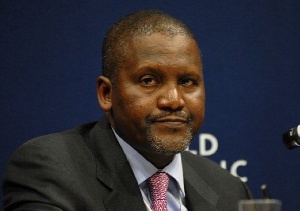 Alhaji Aliko Dangote is the richest man in Africa with a net worth of over $10 billion
Alhaji Aliko Dangote is the richest man in Africa with a net worth of over $10 billion
The world's 2,153 billionaires have more wealth than the 4.6 billion people who make up 60 percent of the planet's population, reveals a new report from Oxfam today ahead of the World Economic Forum (WEF) in Davos, Switzerland
Global inequality is shockingly entrenched and vast and the number of billionaires has doubled in the last decade. Oxfam India CEO Amitabh Behar, who is in Davos to represent the Oxfam confederation this year said: "The gap between rich and poor can't be resolved without deliberate inequality-busting policies, and too few governments are committed to these."
Oxfam's report, 'Time to Care', shows how our sexist economies are fuelling the inequality crisis —enabling a wealthy elite to accumulate vast fortunes at the expense of ordinary people and particularly poor women and girls:
-The 22 richest men in the world have more wealth than all the women in Africa.
-Women and girls put in 12.5 billion hours of unpaid care work each and every day —a contribution to the global economy of at least $10.8 trillion a year, more than three times the size of the global tech industry.
-Getting the richest one percent to pay just 0.5 percent extra tax on their wealth over the next 10 years would equal the investment needed to create 117 million jobs in sectors such as elderly and childcare, education and health.
"Our broken economies are lining the pockets of billionaires and big business at the expense of ordinary men and women. No wonder people are starting to question whether billionaires should even exist," Behar said.
"Women and girls are among those who benefit least from today's economic system. They spend billions of hours cooking, cleaning and caring for children and the elderly. Unpaid care work is the 'hidden engine' that keeps the wheels of our economies, businesses and societies moving. It is driven by women who often have little time to get an education, earn a decent living or have a say in how our societies are run, and who are therefore trapped at the bottom of the economy," added Behar.